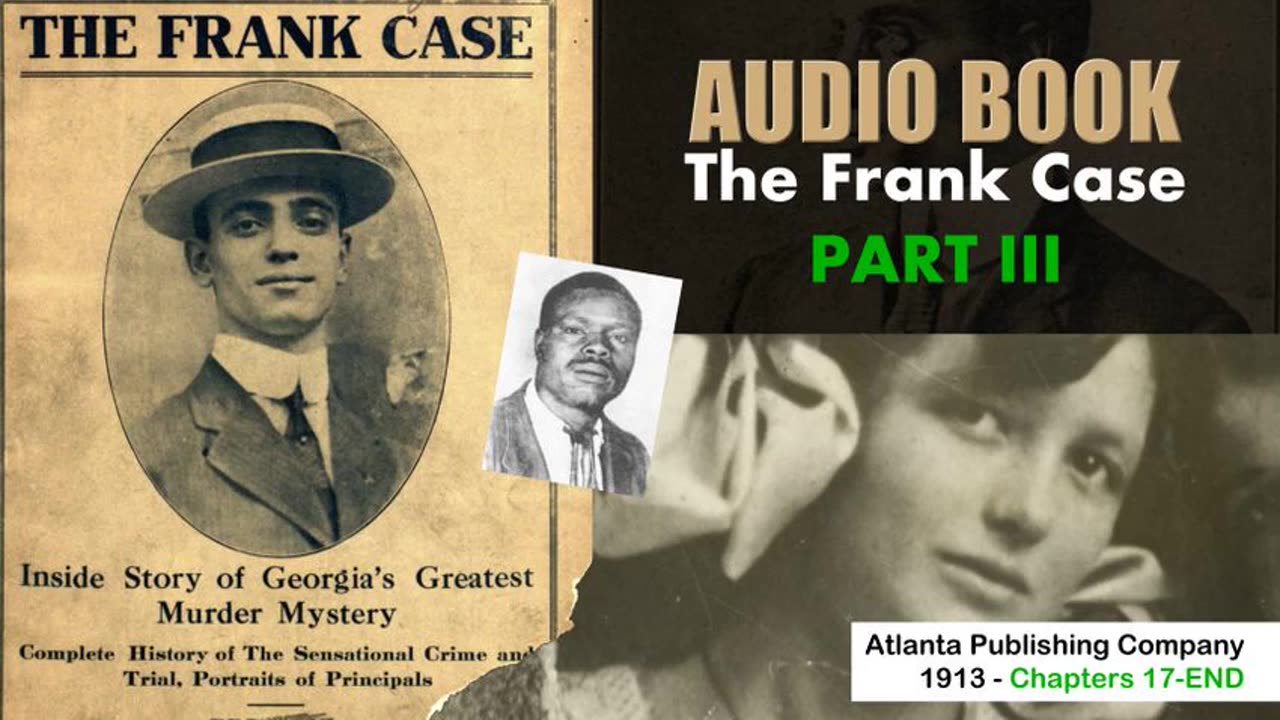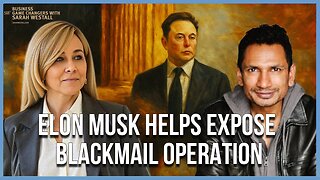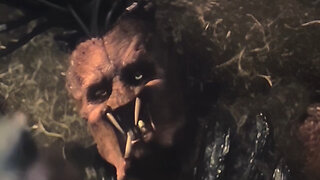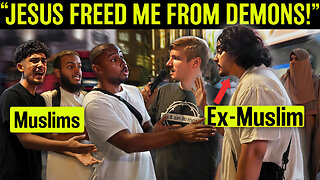Premium Only Content

The Leo Frank Case - 1913 Part 3 Chapters 17 Till The End Of The Book
Judge Roan reversed his decision Wednesday afternoon and announced he would expunge the record of Conley's testimony about past manipulation and behavior that reminded him of Frank. After filing a motion asking the audience to leave the courtroom, Attorney Arnold asked the judge to declare a mistrial when Judge Roan refused. After Dalton left the witness stand, Dr. F.H. Harris concluded his testimony Thursday morning before prosecutors took a break. The defense team immediately presented its case included many doctors such as Leroy Childs. Harris was just making an educated guess. The defense subpoenaed Pinkerton Detective Harry Scott Thursday to testify that Conley was coached before giving his statement to police.
Daisy Hopkins denied claims on Friday, the eighth day of the trial, that Dalton and James Conley visited the pencil factory with lewd intentions. On this day, the defense presented a cardboard copy of the pencil factory that was used to illustrate witness statements for the rest of the trial. Testimony of George Epps, W.M. Matthews and W.T. Hollis, the driver and conductor of the car in which the girl entered the city. In addition, civil engineer Albert Kaufman presented drawings of each floor of the pencil factory.
In the fourth week of the trial, the crowd outside the court grew louder, raising tensions throughout the city. Leo M. Frank, the most serious person directly involved in the incident, maintained an even expression and facial expression. The pressure didn't bother his mother and his wife. The defendant's millionaire uncle, Rabbi David Marks of an Atlanta synagogue, postponed a trip to Europe to console B'nai B'rith President Moses Frank. The fact that his friends stood by the young man when he needed it was the most notable aspect of the whole Frank affair. The references to the defendant and the evidence leading to the famous conclusion of the trial before the jury are the most important details of this story. Four prominent lawyers, including Luther Z. Rosser, made these observations. Reuben R. Arnold and Dorsey, attorneys. Four top lawyers believe Frank has the brains and mental strength to accomplish great things if trained in the right direction. According to Luther Z. Rosser, Frank was the more intelligent of the two and his report showed realism.
Although the suspect is not perfect, criminal defense attorney Reuben R. Arnold, he was a moral gentleman. States take positions based on Conley's comments and stand or fall on them. This is one of the most important parts of the text. Hugh M. Attorney Dorsey disagrees with the unprotected and marginalized working girls who blame him for his bad behavior. He thinks that this person has only fame and no other qualities. He only has authority. That person has no personality. He strangled Mary Phagan to protect his reputation. His blood is visible on his hands. Frank A. Hooper accused the defendants of being Dr. Jekyll abandoned his respectable exterior and descended into a lower social class, where he chose to associate with Dalton and others of similar character rather than those who they came to respect him. It has a good reputation. The factory was an ideal location for obscene and immoral people planning murders. Attorney Dorsey said Frank was driving the young girl on the Hapeville route the Saturday before the murder and tried to get her out of the car several times. One of the factory workers, Emily Mayfield, denied this testimony and said she never saw managers misbehaving with female workers.
On Saturday afternoon, the second week of the trial concluded with the testimony of Herbert Schiff, Frank Young's office assistant. Schiff said it was Frank's habit to prepare financial statements every Saturday afternoon and that the task could not be completed in less than two or three hours. The most important information in this article is from Dr. Willis Westmoreland, former chairman of the state board of health and T.H. Hancock, J.C. Dr. Olmsted, Dr. George Bachman, said that trying to determine the time of death from the state of the food in a corpse's stomach is nothing more than a doctor's gamble. On August 11, the defense attacked Dr. Lee again. Harris and they called several witnesses who swore they saw C.B. Dalton won't believe it. Time contacted Miss Hattie Hall to link the alibi to the Montauk Brothers stenographer and bookkeeper. He described how he met Frank at Montague Brothers on the morning of the murder and asked him to come to the factory and cover for him. Miss Hall's evidence showed that she was at the factory until 2 or 3 o'clock in the afternoon, and that the time of departure coincided with the blowing of the 12 o'clock whistle. According to Joel Hunter, an accomplished accountant and mathematician, Frank could not have completed the financial statements in less than three hours, and with a small amount of additional accounting work in the office, it took 30 minutes to 2 hours. Time became longer. The defense team of the accused inspector general, on Wednesday, the 15th day of the trial, rejected the state's request to call witnesses to question his character. According to two of his colleagues at Cornell in New York, he was so likable that he traveled alone to Atlanta to testify. Several of Frank's college professors and former colleagues traveled far south to be with him during this difficult time. The defense tried to introduce evidence from four people who repeated Conley's story about taking the body to the basement, but lawyers for Dorsey and Hooper strongly objected. This is the most important information in the text. After detailing Conley and Frank's other charges on the day of the murder, William Owens said three other men carried the 100-pound bag containing Mary Fagan's body into the basement. During the investigation, Hooper's defense attorneys tried to downplay the significance of the experiment and sent a letter to the grand jury before the trial began, asking that Conley be charged as an accomplice. When John Ashley Jones testified and spoke about Frank's moral character, the state launched its first attack on the chief's reputation.
When witnesses were called for cross-examination, Dorsey quickly stood up and asked one question after another. Rae Frank, the defendant's mother, turned to face the seated attorney. Herbert Haas, a member of Frank's party, and others led Mrs. Lucille Frank out of the courtroom. For the first time since her husband's trial began, Mrs. Lucille Frank showed significant emotion, and the defendant blushed as counsel asked leading questions of the witness. At that moment, the courtroom became quiet as the lawyer abruptly finished asking questions and sat down. Mrs. Rae Frank wasn't in court that afternoon, but he showed up in his car during the break and gave his son the customary goodnight kiss.
Attempts by Dorsey's attorneys to have the jury hear the implications of those questions were met with strong opposition from the defense. Mrs. Leo's strategy. According to Arnold's attorney, Rae Frank was dishonest, unfair and unethical. But on the early morning of August 14th, Attorney Dorsey, Leo and Mrs. Rae Frank were not allowed in the courtroom. When the women agreed to stop interfering, Judge Roane refused. At about ten minutes past one, Mrs. Helen Curran, of 160 Ashby Street, said she saw Frank standing outside the chemist's shop. Selig's friends said that on the evening of Saturday, April 26, Frank showed no signs of fear.
During cross-examination, attorney Dorsey tried to point out that Frank wanted to appear too carefree tonight and wanted to draw attention to himself by laughing out loud. Saturday, August 16 Mrs. Rae Frank took the witness stand this afternoon and produced a letter dated April 26 written by his son. The work was dedicated to his wealthy uncle, Moses Frank, who was touring Europe at the time and was in New York at the time. The letters included price lists, factory reports, and a letter from Lucille to her niece. This letter was received in New York by Moses Frank, who was on his way to Europe. The 100 witnesses who testify about Leo Frank's morality (mostly girls who worked on the fourth floor of the pencil factory) are the most important information in the document. Then Mrs. E.H. One of the first witnesses said that Carson never criticized Frank at the factory and considered him a good man. When Miss Irene Jackson was called as a defense witness, she testified that Frank came to the door of the girls' locker room on the second floor of the factory and stood there watching the people inside. Conley was in the county jail when Atlanta Journal reporter Harley Branch spoke with him. Branch Conley reported that he did not see Lemmy Quinn enter the factory on Saturday, April 26th. The witness's relationship with the city investigator was revealed during cross-examination by Attorney Dorsey. The doctor testifies. To prove his disproof of William Owens, James Conley created a pantomime of the hidden body on the day of the murder. Most factory workers said Conley had a bad temper and wouldn't believe him if he swore. When the court did not adjourn on Friday, August 16, the lawyers made threats. The collection of evidence took three weeks and is not yet complete. The trial lasted until the middle of the fifth week. This put a lot of pressure on each of the lawyers who were almost exhausted. The court met daily from 9:00 a.m. to 12:30 p.m., making it time for dinner. This happened for an hour and a half in the morning. Court resumed at 2pm and adjourned until 6pm. All the lawyers were on high alert as Luther Rosser had lost 25 pounds and Attorney Dorsey looked pale and uncomfortable. The challenges faced by the lawyers have become more difficult as they have received numerous threatening letters from across the state. Reuben Arnold was followed by three bodyguards and his brother, Attorney Rosser, was always accompanied by two men. Lawyers on both sides received a flood of telegrams and letters from all over the country offering information and accusations. One person in Nashville, Tenn., spent at least $100 sending Mr. Rodger tips and advice on how to defend himself. The most important piece of information in this excerpt is that on Monday afternoon, Frank himself took the witness stand and made one of the most surprising statements ever heard in a Georgia courtroom. His testimony was so impressive that many people began to believe that he was incompetent and not guilty of the crime. Frank started talking at 2:05 a.m. and finished at 4:00 a.m. He was stopped twice by Dorsey's attorneys, who objected to items not in evidence and even took a break to drink water. His voice was as clear at the end of the exam as it was at the beginning. His last sentence left listeners speechless. After Frank finished his speech, the courtroom was silent for a moment, until the sobs of Mrs. Leo Frank and a direct command from Attorney Arnold broke the silence. Frank left with the same confidence and energy he had when he first walked into the crowd four hours earlier. Mary Fagan, a young girl from Brooklyn, is believed to have been murdered by Leo Frank. The sheriff took him to his room in the tower, where he remained calm and in full command of his powers. He did dizzying math, gave a brief account of his life, and used an affidavit to refute the claims of Jim Conley, a black man who came dangerously close to being executed. His father and mother only have money to get by, he has no wealthy relatives in Brooklyn, and his father is disabled. His lawyers will seek compensation by selling part of his parents' property, as no funds are allocated for his defense. As part of his indirect defense, Frank took the witness stand and explained his duties involved in preparing the factory's weekly financial reports. He spoke to twelve men who had the power to kill him, as if his life were in danger. The narrator woke up between 7 and 7:30 a.m. on April 26, he took a leisurely bath, dressed, ate breakfast, and drove down Washington Street or Georgia Avenue, arriving at the factory on Forsyth Street about 8:30 a.m. As usual he went to where he met Mr. Holloway, the day watchman, and met him there. Alonzo Mann, an office worker, was in an outer office. The speaker opened his desk, took off his hat and coat, and opened the safe. Mrs. Maddie Smith asked the narrator for her sister-in-law and an envelope at 9:15.
Last night, when Mr. Schiff handed them a bundle of envelopes, the narrator went to the safe, opened it, and removed its contents. The remaining envelopes were placed in the cash register. At 9:35 or 9:40 Mr. Darley and the narrator left for Montague. On the way they stopped for a drink at Cruickshank's juice shop on the corner of Hunter and Forsyth Streets, where the narrator also bought a pack of his favorite cigarettes.
The narrator and Frank drank and talked for a while. They then went to Montague Brothers and spoke with Mr. Sig Montague, the general manager of the company, and Mrs. Hattie Hall, a stenographer for the pencil company. Mrs. Hattie Hall, Mrs. Arthur White and the office boy were waiting for them on their personal return in Forsyth Street. Then the elevator motor started working and the circular saw in the woodworking shop started working. As soon as they entered, Mrs. Emma Clarke Freeman and Miss Corinthia Hall went upstairs and met Mrs. Corinthia Hall. I asked permission to bring Clarke Freeman. Freeman jacket.
Two people entered. One was Mr. Graham and the other was Earl Burdett's father. The two boys were taken to police headquarters for causing trouble during lunch the previous day, which is very important information for this article. The speaker gave the two fathers envelopes for payment and asked them about their sons' misdeeds. Mrs. Emma Clarke Freeman entered the speaker's office and asked permission to use the telephone before leaving. The narrator calls Miss Hattie Hall and tells her what mail to deliver.
He left the office and returned at the 12 o'clock whistle. Frank explained in detail how to fill an order at the pencil factory. A young woman named Mary Fagan asks the narrator for a paid envelope after Miss Hall leaves the office. I didn't know his name, but the announcer who saw him walking around the factory recognized him. He worked in the metal department until he was fired because some metal did not arrive at the factory. Factory foreman Lemmy Quinn came in and asked where Mr. Schiff was. After completing the task and making progress, the speaker looked at the clock at 1:15 and continued to work. When I called, Minola immediately answered that she would have lunch. The narrator gathered his papers and went upstairs to see the children upstairs. According to Mrs. Arthur White, it was 12:35 when she saw the speaker go by. The speaker does not know what happened. The narrator sees Arthur White, Harry Denham and Mr. White's wife arrive upstairs, one of the most important details in the document. When the speaker asked them if they were ready to go, they replied that they had preparations to make. The speaker went downstairs, gathered up his papers, locked his desk, washed his hands, put on his hat and coat, and closed both the inner office door and the street door. When the whistle blew before lunch, the speaker remained in the inner office until an hour had passed, when he spoke to Arthur White and Harry Denham. The narrator may have gone to the bathroom in response to a natural impulse (ie, nature's call). Defense witnesses' testimony that they had no knowledge of defendant's misconduct and that they never engaged in such misconduct with defendant drew objections from attorney Rosser. Dorsey's attorneys argued that the testimony was offered as a rebuttal to James Conley's testimony and would not be admissible if the witness was trying to prove a separate crime. Defense counsel testified that the witness had no knowledge of the defendant's misconduct and that he never engaged in any misconduct with the defendant before the jury was dismissed. Attorney Rosser objected to his testimony. Dorsey's attorneys argued that the testimony was offered as a rebuttal to James Conley's testimony and would not be admissible if the witness was trying to prove a separate crime. Attorney Rosser ruled that the defense witnesses must first return to the stand for cross-examination. This was based on his statement that the defense witness, Frank, testified about what happened in his office.
Mr. Griffin asked witness Leo M. Frank's general attitude towards women.
When cross-examined by the defence, Miss Myrtis Kato said she was aware of Frank's general behavior and found it unpleasant. In response to the lawyer's question, R.M. Donegan said he knew Frank's identity and it was negative. In 1910 he became associated with Mrs. H. J. Johnson of Stonewall, Georgia, who said he worked in a pencil factory for two months.
She said Frank had a generally poor reputation and was unfamiliar with his relationships with women. The court ruled that the lawyer could no longer ask questions, and soon many women followed suit. One of the women was prepared to testify that Frank proposed to her in his private office and used his key before leaving the room. Miss Dewey Hewell was brought to Atlanta from the Good Shepherd home in Cincinnati to testify about Frank's acquaintance with and conversation with Mary Fagan. He saw her calling herself Mary, putting her hand on his shoulder and standing still while he spoke to her.
On August 20, both sides met Leo M. Frank's trial for Mary Fagan's murder begins. The state's rebuttal ended shortly after noon. It took less than an hour to enter the negative evidence. Lombard Nathan Sinkowitz ME. McCoy took the watch as collateral in January and kept it until August. Others disputed the carriage men's claims that Mary was not with young George Epps when she arrived in town on that fateful day.
Frank A. Attorney Hooper began the state's argument for Frank's conviction with a speech full of language that was sometimes sarcastic, sometimes pitiful, sometimes humorous, but always with dramatic effect. It began a series of eloquent days unprecedented in the history of Georgia. In his opening statement, Mr. Hooper informed the jury that the State was willing to bear the burden of proving the defendant's guilt and would not seek a conviction if the defendant was innocent. He referred the accused to Dr. Described as friends with two other colleagues, Dr. Dr. Jekyll and Mr. Hyde. He is Dr. Jim Conley. Jekyll and Mr. Hyde, men who get along well with two different groups of friends. The most dramatic part of his speech is: “Do not doubt the accused. "The circumstances are that he either killed this young woman or he sat in his office and allowed a black man to kill her and drag her body down the hall and into the elevator and into the basement."
The murder took place in the metal room while Montin Stover was in Frank's office. advisor Mr. Hooper explained to the jury that Frank had sworn to stay in the office from noon to midnight, but Stover went to the office during those hours. Hooper presented less evidence than any of the lawyers who followed him at Frank's trial. Luther Rosser spent the same amount of time arguing with Attorney Arnold, who was sitting on the floor. In one of the longest prosecuting speeches in a criminal case in the South, Attorney Dorsey spoke from 11 a.m. to 12 p.m. Attorney Arnold spoke slowly, choosing his words carefully and pausing for emphasis, and the great actor's gestures could not have been more impressive. His oratory had the power to arouse and captivate the attention of both the judges and the audience. He began by imagining a situation in which the aforementioned jury would be isolated and protected, without reading papers or hearing any proceedings, in order to reach a verdict without bias or partiality. He then lashed out at the loudmouthed idiots who assume that if someone points a suspicious finger in his direction, that person is guilty. The speaker argued that Frank would not have been prosecuted had he not been Jewish and criticized those who tried to punish the defendant "for no other reason than he was Jewish". He expressed his respect for the judges, saying they were above average. He claimed that if he had not been Jewish, he would never have been prosecuted, and Conley, who is black, was called to testify in court.
He demanded that this man be treated fairly before he treated the Jews unfairly. Moreover, it has been pointed out that some of the evidence in a case is presented rather than proved, so there is a certain class of people who are always ready to present evidence. According to Arnold, the state's theory of Mary Fagan's murder is preposterous and ridiculous. As a white Jew, Reuben Arnold exposed racism and prejudice against African Americans ("blacks"). He said the killing of Mary Fagan was brutal and typical of black people, and that Conley was far more likely to have killed the girl than Frank. His guess was that Conley was half-drunk that Saturday morning, his passions were running high, and he was jealous of every girl and woman who passed by.
Conley grabbed Mary Fagan as she came down the stairs and punched her in the left eye, knocking her to the ground. After Frank left, she waited outside the factory, lowered her body down the elevator shaft, and finished the brutal work in the basement.
Attorney Arnold established the rule that before a man could be convicted on circumstantial evidence alone, the evidence must be strong enough to exclude all reasonable hypotheses other than the guilt of the suspect. Mary Fagan's murder can be more easily explained by the theory that Conley did it than by the theory that Frank did it. Attorney Arnold had to convince the jury of that. Suspicion fell on Frank because he was the only person in the factory with the funds to do the job. On the fourth floor were Mrs. White, Denham and Arthur White. Until Frank's arrest, no one knew that the factory was located in an elevator shaft and/or mine, a major crime scene.
Mr. Starnes may think he is seeking justice and truth, but he is not. Evidence obtained by third degree torture, torture or other methods is dangerous evidence.
Being told he couldn't swear allowed Conley to make a great story. The most important information in this text is that blacks mocked their superiors, tried to speak their mind, and invented stories to defend themselves. Anyone who has been near a court knows this. He found out that they were trying to impeach Frank and file a case against him.
The attorney general vowed to pursue the case against Frank as far as the courts would allow, and investigators feared they would be criticized if they did not. The attorney general, fearing that Frank would be criticized if he did not pursue investigators further, vowed to maintain the case against Frank until the court allowed it. The attorney general promised to pursue the case against Frank as long as the courts would allow, and the detectives feared they would be fired if they did not pursue the case. The most important information in this passage is that Dalton arrives at the factory between 1 AM and 2 PM while Frank is eating lunch. The man does not know which way Dalton entered the building. I just saw him walk through the front door. The records show that there is nothing sinister about the factory and that the Clark Woodenware Company and the Pencil Factory entered through the same door. In addition, the factory was under the control of Starnes, Black and Pat Campbell, who did not dare testify for fear of questions about how they obtained these statements from Conley. The recent Atlanta riots were covered in an audio book. The Beavers formed a deputy team to search for criminals in the city and signed a new 10-year contract. Dorsey's friend Hooper said that while Schiff and Darley were morally reprehensible, there was no evidence of Schiff's guilt or wrongdoing.
The most important statement in the trial was made by Attorney General Hugh M. Town. Prosecutor Rosser spoke for more than 11 hours over three days after closing Friday afternoon. He continued his speech on Monday morning and finished it before noon.
The main reason for the long delay was the fear of trial on Saturday night. Dorsey handled all aspects of the case with detail and honesty, and his conviction of Frank was the harshest sentence for a criminal defendant in American history.
He was greeted with applause and most praised his actions and his laudable efforts to bring the young factory manager to justice. “This is not just an important issue; And this is something special. The crime was unique, gruesome, gruesome and demonic. Investigating the crime required vigilance, honesty and dedication on the part of the detectives and myself. The four Messrs. Arnold and Rosser and the two Messrs. Haas are the most important details in this text because of their status and importance. Mr. Roger, who directs the wind and causes storms, and Mr. Arnold, who is gentle as a man who cuts off men's heads and sinks ships, acted alone and took the responsibility. When the detectives beat the suspect so badly, the suspect's kind mother stood up and called the suspect a dog in front of everyone. Mr. Dorsey did not need the defendant's approval, but if he had, his integrity would be called into question. Mr Arnold believes the detectives must have been angry because they were biased. When Mr. Dorsey questions the detectives' motives, Mr. Arnold says they were paid to play the part. The case was not based on the fact that the accused was Jewish, and the first time prejudice arose in the case, it was brought by two men who, according to the most important details in the text, were willing to put these questions to Kenley. The speaker claims that the defendant's ancestors became civilized while our ancestors were still eating human flesh and that the defendant's race is superior to ours. He admires JP Benjamin, Strauss, Strauss's diplomats, and the Israelites, the race that gave birth to Rabbi Marks. Becker got his way when he tried to kill Rosenthal. Abe Roof and Abe Hummel were killed in New York and San Francisco, and Schwartz was jailed for stabbing a girl to death. The defendant is a man of bad character, and according to this audiobook, David was a good man until he forced old Uriah to confront him in order to steal his wife. Benedict Arnold was a brave man who earned the respect of everyone and the leaders of the Revolutionary War before betraying his country. The Irish Knights had a good reputation before Oscar Wilde was convicted. Abe's Hill in San Francisco had previously had a good reputation, but it ruined Smith and everyone who came in contact with him. Good character is useless if you have proven examples.
Cases of crimes committed by intellectuals are the most important information in the document. Mayor McEwan of Charlottesville, Virginia, shot his wife while she was in the bathtub, and a Virginia grand jury sentenced him to life in prison. Richardson, a Boston pastor who had gained the trust of his followers, became involved with another young woman and tried to get rid of her, but lost himself to the point of being killed. Henry Clay Beatty, head of a famous family, proved his morality by murdering his wife in cold blood after taking her out for a walk. Although the detectives in the case were humiliated and humiliated, a jury of Virginia farmers sentenced him to death and uplifted the citizens of that vast community. Beatty never confessed to the crime, but left a note to be read after his death to admit guilt. Crippen, a senior British doctor, killed his wife because he was in love with another woman. Jim Conley wasn't fired, but his overall personality was influenced by the villains employed at the National Pencil Factory. His relationships with Miss Rebecca Carson, Miss Jackson, Miss Kitchens, Darley, and Miss Maddie Smith about what he did on April 26th are all related to his inability to question these crazy fanatics. A description of the dressing room, how to get to Miss Kitchen's dressing room, what Darley and Miss Maddie Smith did on April 26th, and how to get to Miss Jackson's dressing room. Jim Conley, a black man who worked at a pencil factory, was charged with murder. He stole a bag from the pencil factory, went into the medal room with the poor girl, heard the footsteps of two men leaving, saw blood on the second floor, heard Holloway and Boots Rogers testify, and saw blood on the second floor . . . A loop of string is seen on the floor, only bills are seen, blood is seen on the second floor, and the footsteps of two men are heard walking. Also that afternoon, Arthur White received a loan of $2, but there is no record of Frank contributing to this loan. Frank also mentioned when he said he had family in Brooklyn and when Mr. Rosser defended Conley when asked about Mincey. The jury evidence at the trial of the defendant Mincey is the most important piece of information in this audiobook text. A jury found Mincey guilty of murdering Mary Fagan, a young woman who was found dead without a trace. Mincey strangled Mary to death. Jurors will find the suspect guilty of everything he did and all the circumstances surrounding the young girl's murder. The jury believed that the defendant's cage was missing from the ground floor of Newt Lee's house, as were the walking stick and the bloody shirt. The jury also included Mrs. Rae Frank who was his wife and
Lucille Frank, the defendant's mother, who covered her eyes with her hands and appeared distraught. The jury ultimately concluded that Mincey had killed Mary Fagan and returned a single verdict. Each time the intonation "Guilty, guilty" was uttered, the gong of the Catholic church located a stone's throw from the courthouse rang the bell of guilt. Judge Roane immediately began reading the charges, which concluded at 12:47 p.m. The long trial was nearing its end and the jury's decision was the latest.
There was an open conversation about racial differences and the risk of violence when warranted. At 12:47 p.m., Judge Roan concluded his speech and informed the speakers that he alone would review the admissibility of evidence and the credibility of witnesses. Just before midnight, the jury re-entered the courtroom after going to a cafe across the street for dinner. When Attorney Dorsey left the building 10 minutes later to cross the street to his office, he was swept away by the crowd. They heard Dorsey cheering. The 12 male jurors were assigned rooms on the fourth floor of the courthouse. Sheriff Plennie Minor said that shortly after three o'clock the Windburn foreman had reached a verdict. Judge Roan was called from home to join Attorney Dorsey in requesting a second vote. To prevent a possible incident, the suspect motioned for him to arrive and remained in a cell near the tower. The courtroom fell silent as the jurors took their seats in their individual boxes.
The ritual gestures described can have only one meaning. Judge Roan formally addressed the jury: "Guys, have you reached a verdict?" he asked. "This is correct." Brigadier General Winburn replied. "Read," the judge ordered. "Our jury finds the defendant guilty." The foreman stood up with the jury's verdict in his hands. This was the final conclusion of the "Leo Frank Incident".
-
 2:28:12
2:28:12
vivafrei
15 hours agoEp. 291: More Epstein Documents! Stacey Plaskett SCANDAL! Butler Cover-Up, Tucker Smea & MORE!
205K228 -
 6:06:22
6:06:22
xLuigi34x
7 hours ago100 Follower Special! Going to 100% The DKC Trilogy on stream!
40.7K7 -
 50:27
50:27
Sarah Westall
5 hours agoMusk Helps Expose the Most Consequential Political Blackmail Operation in Modern British History
22.8K14 -
 4:52:47
4:52:47
Due Dissidence
14 hours agoTrump GOES NUCLEAR on MTG, Tucker Exposes Butler COVERUP, Shmuley SUED For HILARIOUS Reason
36.9K19 -
 20:13
20:13
RealReaper
9 hours ago $1.98 earnedPredator Badlands: If You Like This Movie Then I Hate You
22.8K17 -
 LIVE
LIVE
GritsGG
7 hours ago#1 Most Warzone Wins 4000+!
406 watching -
 41:54
41:54
Nicholas Bowling
8 hours ago $1.67 earnedWhile Preaching to Muslims, EX-MUSLIM Shares Why He Left Islam (London, UK)
23.9K10 -
 2:25:28
2:25:28
bucketofish
6 hours agoNoise Floor \\ Behind the Mix - Ep 002 - Wide Awake by Katy Perry
28.3K1 -
 3:07:04
3:07:04
Biscotti-B23
6 hours ago $2.87 earned🔴 LIVE DISPATCH PLAYTHROUGH & PARTY GAMES
22.7K1 -
 LIVE
LIVE
Lofi Girl
2 years agoSynthwave Radio 🌌 - beats to chill/game to
86 watching